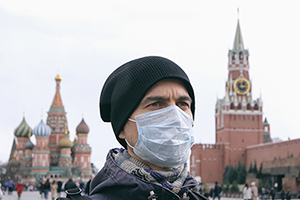Eyes are on Ukraine this week as Russia continues its onslaught. Amidst the conflict, there’s a health story.
A country’s military preparedness and its ability to sustain a long-term war campaign are inextricably linked to the health of its populace. Recall the brouhaha over a recent report that indicated that U.S. national security was threatened by the lack of fitness of its military recruits:
“The study cites that 27 percent of Americans 17 to 24-years old are too overweight to qualify for military service ─ obesity was the second highest disqualifying medical condition between 2010 and 2014. It also reports that 47 percent of males and 59 percent of females failed the Army’s entry-level physical fitness test while entering basic training.”
Russia still trails the U.S. in obesity, but the Russian populace is rapidly catching up to other Western countries. Historically, famine and starvation have long plagued Russia, but the trend has reversed; with improvements in productivity and prosperity after the end of Communism, Russia saw an increase in obesity by 33% between 1995 and 2004. Russians traditionally consume a rich, high-fat diet. Economic improvements and the introduction of modern ultra-processed foods have prompted one third of recently surveyed Russians (30.3%) to be obese and another third (34.3%) to be classified as overweight.
Of interest, as in the U.S., inhabitants of wealthier more affluent urban areas are less prone to obesity (24.4%), whereas residents of rural impoverished regions are heavier (35.5%).
This is likely to mirror the military recruitment problems of the U.S. which draws personnel disproportionately from Southern rural states, where overweight predominates; Russia’s urban elite have the wherewithal to avoid military conscription and are less likely to sign up voluntarily, whereas most recruits come from far-flung backwater states. Most conscripts are poor and from impoverished regions outside prosperous Moscow and St. Petersburg.
Russia’s healthcare system is already under considerable strain. A recent Bloomberg survey ranked Russia dead last for healthcare efficiency among 55 developed countries.
[Note: The U.S. didn’t fare much better. It was ranked 50 out of 55]
Russian citizens seem to agree. In a 2016 survey, only 2% said they were proud of the Russian healthcare system.
The problem is a legacy of the state-run system under Communism. Emphasis was placed on training doctors and medical professionals. Russia has one of the highest ratios of doctors to populace among Western countries. But their hospitals and clinics outside of showcase facilities in major urban centers are chronically under-resourced. According to Gennady Gudkov, an opposition politician and retired KGB colonel:
“Russia state hospitals and clinics are in a tragic condition, especially in the provinces. There is outdated and often nonfunctioning equipment, a lack of medicines and hospital beds, and a shortage of medical specialists. The families of patients are often forced to bring them food.”
Most health professionals are employees of the state; doctors typically earn 70-75% of what workers in other sectors of the Russian economy make. This has prompted many of the best to emigrate to more hospitable countries—a medical brain-drain.
Lately, a two-tiered medical system has emerged, with private physicians and clinics for the affluent, although well-to-do Russians often seek healthcare in other countries. Those opportunities will be constrained as embargoes on travel for Russian nationals kick in.
Russia’s healthcare system, conceived as a hedge against once-prevalent infectious diseases like tuberculosis and diphtheria in the 20th Century, hasn’t executed a successful pivot to address the chronic degenerative diseases that curtail Russians’ longevity today. These are primarily lifestyle-related, the results of poor diet, smoking, and above all, alcoholism.
A 2002 Rand Corporation report entitled “Russia’s Demographic Crisis” reveals:
“Russia holds two somber records: the lowest life expectancy among males for a developed country in peacetime (59 years) and the largest gap between male and female life expectancy in the world (13 years) . . . deaths from accidents, violence, poisoning, and other non-natural causes are primarily responsible for the latest rise in mortality.”
One of the biggest threats to the viability of a modern country is demographic decline. When more people die than are born, productivity plummets and the country becomes burdened with older retired pensioners supported by a shrinking base of working taxpayers. Compounding the problem is Russia’s “abortion culture”. Faced with dim economic prospects, and the need to join the workforce to support their families, a high percentage of Russian women are invoking abortion as a means of family planning.
Russia has the largest adult smoking population in Europe. Approximately 35 million people ages 15 and older currently smoke. More than 60 percent of men and 22 percent of women in Russia smoke, notwithstanding public health efforts to curb advertising and sales of tobacco.
Russia’s high rate of casualties in the Ukrainian war is going to place an unsustainable strain on its already compromised healthcare system. Traditionally, serious battlefield injuries outnumber deaths in a ratio of three to one. The U.S. has successfully whittled down deaths by means of a highly sophisticated medevac and triage system, which results in remarkable survival of even the most critically wounded soldiers. An American combat casualty can find themselves whisked to a modern trauma center in a place like Landstuhl, Germany in a matter of hours.
Not so much with the Russian military. Whether it’s a question of preparedness or deliberate callousness, it’s likely that wounded soldiers will languish for want of prompt care.
And aftercare will be a big issue. Even with casualties below what Russians have sustained at the hands of the Ukrainians in a mere six weeks, the number of disabled veterans of our Iraq and Afghanistan campaigns has taxed VA hospitals. Vets complain of inadequate care and bureaucratic snafus, but they’re likely far better off than their typical Russian counterparts.
War produces lots of amputees, and the gradual dissemination of Russian disabled into their communities will convey a stark visual message to the Russian populace. In the U.S., they are the beneficiaries of the latest pricey innovations in advanced prosthetics and rehabilitation programs, like those being pioneered at Walter Reed National Military Medical Center. It’s doubtful that such resources will keep up with the surging demand in Russia.
Another consequence of war is PTSD. The conditions of combat conspire to break the spirits of frontline fighters. The silent wounds of thousands of returning Russian soldiers will incapacitate them and render them a strain to a healthcare system unlikely to be geared to meet their needs—and a government perhaps unwilling to acknowledge their demoralization.
Absent from Russia are philanthropic groups like Wounded Warriors and Tunnel to Towers, that fill in the gaps stateside for disabled veterans and their families when government assistance falls short. Will Russian voluntarism similarly rise to the occasion?
It’s said that “an army travels on its stomach”. Well-publicized videos have emerged of abandoned Russian MRE’s (meals ready-to-eat) with 2015 expiration dates. With corruption and inefficiency plaguing Russian logistics, and overstretched supply lines harried by Ukrainian ambushes, the invaders resorted to pillaging homes and stores for sustenance. A few were rewarded with food and alcohol poisoned by resistant civilians.
In another miscalculation, Russian troops occupied the “dead zone” around Chernobyl. They dug trenches and churned up dirt with their mechanized vehicles. Weren’t they warned that these abandoned regions were laden with radioisotopes whose radioactive half-lives could be measured in centuries? Perhaps the bitter lessons of the 1986 reactor explosion have acquainted Russian doctors with care measures to mitigate radiation exposure. But the effects are subtle, long-lasting, and mostly irreversible. Will the cash-strapped Russian government allocate funds for surveillance and aftercare like the U.S. did with its World Trade Center Victim Compensation Fund, comprising $10 billion in awards for those exposed near Ground Zero?
Add to this the continuing burden of Covid. Military campaigns are notorious for being “super-spreader” events; witness the incredible toll of Spanish Flu in 1918-19 among returning World War 1 doughboys. Around half the Russian population is vaccinated with their home-grown “Sputnik” vaccine, of uncertain long-term efficacy. According to a recent Washington Post article:
“Multiple polls published last year by Levada Center, an independent polling agency, found that more than half of Russians don’t want to be vaccinated and are not afraid of the disease. Denis Volkov, Levada’s director, explained in interviews that Russians were not ready to be vaccinated ‘because they do not believe the authorities.’ ‘People do not want to get a Russian shot,’ Demarais, of the Economist Intelligence Unit, said. ‘Even in Russia, the people will always prefer a Western shot’.”
In view of new stringent embargoes, foreign vaccines are unlikely to be forthcoming. New antiviral medications promise to lower the toll for Western countries, but will Russians have access to them as international pariahs?
Therefore, even if Russia were to score some tactical victories as their campaign unfolds, it’s likely that the Ukrainian invasion will portend serious health setbacks for a nation already burdened with medical woes.








